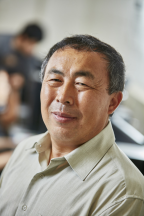Sherman Shen, PEng

Biography
Dr. Xuemin (Sherman) Shen is a University Professor in the Department of Electrical and Computer Engineering at the University of Waterloo, specializing in wireless communications and networking. He is a Fellow of the Institute of Electrical and Electronics Engineers (IEEE), the Royal Society of Canada, the Canadian Academy of Engineering, and the Engineering Institute of Canada. Professor Shen also serves as the Editor-in-Chief of the IEEE Internet of Things Journal and Springer Peer-to-Peer Networking and Applications.
His research focuses on a wide range of topics in wireless communication networks, including capacity analysis, mobility and radio resource management, quality-of-service provisioning, wireless/Internet interworking, network modeling, and stability and performance analysis. He has also been at the forefront of developing algorithms and protocols for wireless network security and privacy preservation. His work has been applied to various areas, including vehicular networks, wireless body area networks, remote e-healthcare systems, wireless ad hoc and sensor networks, and smart grid technologies.
Dr. Shen has received numerous accolades for his contributions to the field, including the R.A. Fessenden Award (2019) from IEEE Canada, the James Evans Avant Garde Award (2018) from the IEEE Vehicular Technology Society, the Joseph LoCicero Award (2015), and the Education Award (2017) from the IEEE Communications Society. He has also been recognized with the Award of Excellence in Graduate Supervision (2006) and the Outstanding Performance Award (5 times) from the University of Waterloo.
Research Interests
Wireless communications and networking
Resource allocation and mobility management
Wireless network security and user privacy
Connectivity and Internet of Things
Autonomous and connected car
Smart communities
Education
1990, Doctorate Electrical Engineering, Rutgers University, United States
1987, Master of Applied Science Electrical Engineering, Rutgers University, United States
1982, Bachelor of Applied Science Electrical Engineering, Dalian Marine University, China
Teaching*
- ECE 610 - Broadband Communication Networks
- Taught in 2021, 2023, 2024
- ECE 715 - Wireless Communication Networks
- Taught in 2021, 2022, 2023
* Only courses taught in the past 5 years are displayed.
Selected/Recent Publications
X. Shen, J. Gao, W. Wu, K. Lyu, M. Li, W. Zhuang, X. Li, and J. Rao, AI-assisted network-slicing based next-generation wireless networks, IEEE Open Journal of Vehicular Technology, to appear, , 0000
N. Cheng, F. Lyu, W. Quan, C. Zhou, H. He, W. Shi, and X. Shen, Space/Aerial-Assisted Computing Offloading for IoT Applications: A Learning-based Approach, IEEE Journal of Selected Areas of Communications - Special Issue on Network Softwarization & Enablers, 1117, 0000
R. Ding, Y. Xu, F. Gao, X. Shen, and W. Wu, Deep Reinforcement Learning for Router Selection in Network with Heavy Traffic, IEEE Access, 37109, 0000
N. Chen, J. Ma, M. Wang, and X. Shen, Two-Tier Energy Compensation Framework based on Mobile Vehicular Electric Storage, IEEE Transactions on Vehicular Technology, 11719, 0000
K. Zhang, X. Liang, J. Ni, K. Yang, and X. Shen, Exploiting Social Network to Enhance Human-to-Human Infection Analysis Without Privacy Leakage, IEEE Transactions on Dependable and Secure Computing, 607, 0000
J. Ma, N. Zhang, and X. Shen, Elastic Energy Distribution of Local Area Packetized Power Networks to Mitigate Distribution Level Load Fluctuation, IEEE Access, 8219, 0000
A. Abdallah and X. Shen, A Lightweight Lattice-based Homomorphic Privacy-Preserving Data Aggregation Scheme for Smart Grid, IEEE Transactions on Smart Grid, 396, 0000
In The News
Graduate studies
I am currently seeking to accept graduate students. Please submit your graduate studies application and include my name as a potential advisor.